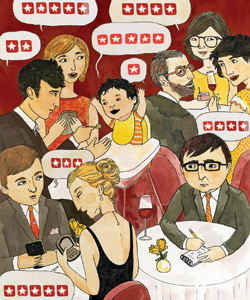 While promoting his new book in June, Anthony Bourdain told a crowd at a Manhattan Barnes & Noble that I was dead. If somehow he’s right—and plenty of people consider the chef/TV personality/professional Molotov cocktail thrower an authority because he produces the best sound bites—my cause of death was Yelp. “We’re way beyond [asking], ‘Will Yelp and sites like that determine our restaurant choices?’” Bourdain said of the hugely popular San Francisco–based user review site. “That’s already the case. The dinosaur has died. Only the brain has yet to receive the message.” As this publication’s dining critic and free-floating reptile brain, I’ll try to grunt out a retort.
While promoting his new book in June, Anthony Bourdain told a crowd at a Manhattan Barnes & Noble that I was dead. If somehow he’s right—and plenty of people consider the chef/TV personality/professional Molotov cocktail thrower an authority because he produces the best sound bites—my cause of death was Yelp. “We’re way beyond [asking], ‘Will Yelp and sites like that determine our restaurant choices?’” Bourdain said of the hugely popular San Francisco–based user review site. “That’s already the case. The dinosaur has died. Only the brain has yet to receive the message.” As this publication’s dining critic and free-floating reptile brain, I’ll try to grunt out a retort.
You don’t know who Yelpers are. “Karen L.,” who gushes that she’s just had the “Best. Meal. Ever” at a cute little gastropub, may be the owner’s cousin. “Dennis C.,” who rips the place a new one, could be a recently fired waiter who believes he is doing the bidding of a demon possessing his charcuterie. The once-vibrant river full of “Real people. Real reviews”—as Yelp describes itself—now flows into an unnavigable sea where sulky ax grinders and anonymous shillers lurk, and it’s too late to reverse the flow.
Yelp doesn’t know who Yelpers are, either. The site’s so-called spam filter claims to separate truth from tripe, but anyone who has browsed the reviews can see that huge numbers of them sound like blatant PR. And the filter’s rejects—which Yelp publishes in the interest of transparency—include plenty that read like they came from Joe Average. To exhume precious nuggets of unbiased insight, you’re left wading through the gushers, the haters, the incoherent, and endless exclamation points. If this sounds like fun to you, have at it.
Even impartial people have divergent tastes. Once you’ve macheted your way down to the one-half of 1 percent who seem like reasonable, agenda-free folks, you may find that they don’t share your preferences—no matter how prolific or popular their reviews may be. And you could learn this lesson the hard way after a review convinces you to lay down $500 at Schwa, only to find that you hate Rage Against the Machine at 5,000 decibels so much you don’t care what miracle is on your plate.
The bigger Yelp gets, the less you can trust it. When the site began in 2004, it built its community organically: without ads. The day it began selling “sponsorships” to the businesses being profiled, the end was near. Allegations that Yelp’s sales team was playing favorites with advertisers and extorting nonadvertisers followed (strongly denied by Yelp), shifting the conversation to stories of people feeling used or duped.
When Zagat took off in the 1980s, the Bourdains of the era prattled about the death spiral of conventional dining criticism. Didn’t happen. Some found Zagat’s distillation of thousands of diners’ opinions into numbers to be democratizing. Others saw the accompanying anodyne blurbs as meaningless collections of three-word descriptors and preferred to stick with traditional in-depth opinions—the kind that could be provided by, say, a reliable individual with a consistent viewpoint, an approachable yet authoritative voice, and more than a dozen years in the field (i.e., me).
It won’t be long before yet another website emerges to correct Yelp’s mistakes and introduce new ones. They can fight over page views. History has proved there’s room for everyone: Zagat with its safe convenience, Yelpers railing against the perceived elitism of food criticism, sluggish quadrupeds like me—even cavemen like Bourdain.
Many scientists believe a massive asteroid crashed into Earth 65 million years ago, producing noxious material that killed the dinosaurs. In Bourdain’s world, Yelp apparently represents the mammals that ruled in the long global winter that followed. That analogy is wrong. Yelp is not the evolved mammalian species. It is the asteroid. But the dinosaurs in this metaphor, flawed as we are, will roam Earth long after Yelp is gone.
Agree or disagree? Weigh in in the comments below.
Illustration: Rachel Harris


